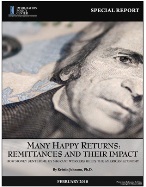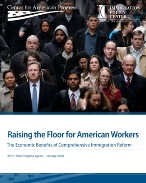by Bruce and Judy Hake
Comprehensive immigration reform is one of the most pressing problems for the United States. This is expected to be a key issue for Congress in 2010.
Many faith-based organizations are motivated by the Bible in advocating for reform. To counter this, the restrictionists have tried to preempt, issuing a report that purports to prove that the Bible justifies a harsh stance on immigration.
Building on an article we wrote in 1998, in a new article published on January 1, 2010 in Bender's Immigration Bulletin, we debunk the restrictionist argument and show that the Bible actually does support a generous attitude towards immigrants and immigration. Indeed, it mandates such a view.
There are both religious and non-religious people on both sides of the debate over comprehensive immigration reform. One does not need to be religious in order to advocate for the rights of immigrants. But religion is very important for many people involved in the debate. That being so, it is important to have an accurate view of what the Bible really says about immigration, and we have tried our best to show that.
Published On: Tue, Jan 26, 2010 | Download File




